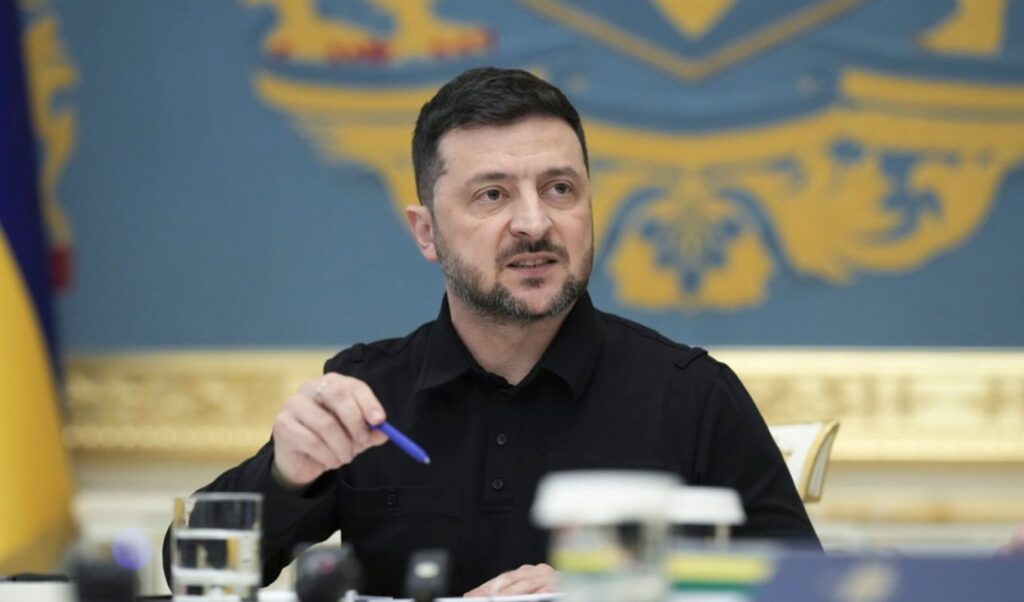Ukraine’s President Volodymyr Zelensky will travel to Turkey tomorrow, Wednesday (19/11), for meetings with the country’s leadership. As he stated, the goal of his visit is to “revitalize negotiations” to end the war with Ankara’s assistance. Zelensky said Ukraine has “developed solutions that we will propose to our partners.”
“Ukraine’s highest priority is to do everything possible to bring the end of the war closer,” he says, adding that he also seeks to resume prisoner exchanges with Moscow.
It is recalled that last week Russia also declared itself “ready for peace negotiations with Ukraine in Constantinople,” as reported by the TASS news agency citing Russian Foreign Ministry official Alexei Politsouk. According to TASS, the Russian official stated that Turkish officials have repeatedly proposed resuming peace negotiations.
It should be noted that Zelensky is in Spain today, Tuesday (18/11), where he is expected to meet with the country’s Prime Minister Pedro Sanchez, coming from France where he and his French counterpart Emmanuel Macron signed a letter of intent on Monday (17/11) in Paris for the future purchase of up to 100 Rafale fighter jets by Kyiv, paving the way for the first delivery of the specific French aircraft to the Ukrainian air force.
Turkey attempts to play a role in Ukraine conflict while ‘frustrated’ by energy developments
Turkey appears to be playing its own role in the Ukraine conflict, showing itself trapped by recent developments in the SE Mediterranean that strengthen Greece, as well as by the Greece-Cyprus-Israel axis. As reported by Chrysa Makri’s investigation on parapolitika.gr, Ankara’s frustration is mainly attributed to its inability to break free from Russian natural gas, as demanded by the US and EU in order to proceed with cooperation on defense, energy and geostrategic (e.g. Syria) issues.
Former ambassador George Poukamisas, speaking to parapolitika.gr and Chrysa Makri, argues that “the Americans are pressuring Turkey to cooperate energetically with them, but the discussions are not progressing, precisely because Turkey still depends on Russian natural gas, which it also transports to Western European countries by changing the name of origin. It does this because the size of the Turkish economy may be larger overall compared to Greece’s, but at the same time, if we take it per capita, it is lower. Consequently, it needs cheap Russian natural gas. It cannot divest itself of this advantage it has to switch to American gas. So as long as this situation lasts, the argument in our favor really works and the possibility of what we call the Vertical Corridor is consolidated. It is consolidated overall, because it doesn’t only concern hydrocarbon flows, it concerns rail and road transport and communications. We will be in an even better position when we manage to extract our own hydrocarbons from southwest of Crete, in the Ionian Sea, etc.”
Greece’s emergence as an international hub for American LNG in Europe, either through ports or through a new rail connection from Thrace to the Balkans, will for the first time bring about a bypass of the Black Sea. Does this isolate Turkey from Balkan pipelines? Energy Policy professor and Atlantic Council associate Charles Ellinas (who organized the P-TEC Summit at Zappeion) explains to parapolitika.gr that if Europe continues the same tactic, namely pretending not to see that Turkish gas is ultimately Russian, nothing will change in the correlations. As he emphasizes, “Turkey is currently in negotiations with Russian Gazprom to renew the contracts – the long-term contracts it has – which are expiring now and, as recorded in the press, Turkey will renew them without reducing natural gas quantities. This means it has decided to continue sending Russian natural gas to Europe. It is up to Europe to cut off its supply, excluding quantities coming from Azerbaijan. In this case Turkey will face difficulties. Additionally, we should note that Trump is simultaneously giving incentives to Turkey, like us, to utilize its pipelines. He provides incentives to Turkey to promote a larger natural gas and oil corridor, not only from Azerbaijan, but also from Caspian Sea countries, from Turkic-speaking countries, with Turkey as the center of this corridor. If Turkey cooperates, there’s a possibility Trump will give it the F-16s. Our position that America leaves Turkey out is wrong. America doesn’t leave Turkey out, neither does NATO, nor Europe.”
On the other hand, the high tones used in Turkey recently are interpreted by many as pressure it receives from Greece’s geostrategic upgrade, as well as Cyprus’s. They also show that it is particularly concerned about the reactivation of the 3+1 scheme (Greece, Cyprus, Israel and the US).
Experienced ambassador George Poukamisas attributes Ankara’s anxiety more to Israel’s strengthening, which he considers a greater threat to its interests at this moment. As he says, “Turkey feels squeezed again, at the same time that for many years – I refer to the last five years, especially since the Turkish-Libyan memorandum was signed – there was a sense that Turkey was pressuring Greece. Now, therefore, a relationship is developing which is opposite. And it has to do with Greece, Cyprus and Israel. The matter is more complex. I would say Turkey is more concerned about Israel, which in turn is very concerned about Turkey. First of all because the nuclear fuel power plant in Turkey’s Akkuyu opposite Cyprus is about to start operating. It’s very close to Israel and Israel is worried. And additionally it appears there is a concentration of Turkish military forces in occupied Cyprus, which doesn’t target the free territories of the Republic of Cyprus, but Israel, as Israel itself believes. Of course, we’ve heard war drums many times. I don’t believe Turkey will do anything. I estimate that various Turkish warmongering retired officers say these things, whom major Turkish television channels host opportunely and inopportunely.”




